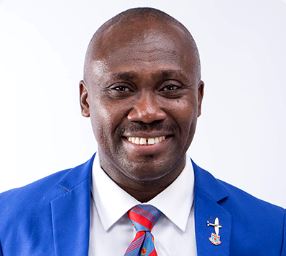25 June 2024
Regrettably, the IMBIZO7 Conference has been canceled due to unforeseen circumstances. The information previously provided on this page is no longer applicable.
Workshop 3: Governance transformations for resilient coastal fisheries and aquaculture
Keynote Speaker: Denis Aheto

Denis Aheto is a Professor of Coastal Ecology and Director of the Centre for Coastal Management – The Africa Centre of Excellence in Coastal Resilience (ACECoR) at the University of Cape Coast in Ghana. He is a distinguished German trained academic (DAAD Scholar) and expert in coastal management, with over 10 years of project management experience. He is the authorized representative of institutional donor funded projects in coastal and fisheries management at the University of Cape Coast funded by the World Bank, USAID and DANIDA among others worth over US$ 15 million. He was instrumental in the establishment of the Centre for Coastal Management (CCM) at the University of Cape Coast in 2013. His academic and professional awards include the German Academic Exchange Service (DAAD) Prize in 2007 for outstanding academic achievement at the University of Bremen. In 2015, he was awarded the University of Cape Coast’s Award of Honour as Distinguished Lecturer. He is the author of numerous scientific articles and has also authored several consultancy and commissioned project reports. He is a member of the United Nations Pool of Experts for Global Assessments on the state of the marine environment. He is also a member of the World Bank interim Technical Advisory Committee (iTAC) of the West Africa Coastal Area (WACA) Program and a member of the Advisory Board for the US Government’s Feed the Future program of USAID. At the national level, he is a member of the UNESCO Man and Biosphere (MAB) National Committee under the auspices of the Environmental Protection Agency of Ghana.
About this workshop
Globally, coastal fisheries and aquaculture support the livelihoods and food security needs of millions of people. Such production activities (whether capture fisheries or aquaculture) are anchored in local communities, yet also provide significant contributions to regional and national economies. However, there remain substantive challenges with the sustainability and viability of fisheries and aquaculture, including efforts to reduce the potential for conflicts between these activities. In this context, tensions, definitions, barriers and strategies associated with governance are a crucial area of focus. Governance is defined here as the broader processes and the institutions through which societies make decisions at multiple levels, including diverse ‘modes’ of decision making, such as community-based, collaborative, top-down, market-centred, or some combination of some of these. Other frameworks and approaches of interest that encourage more participatory modes of governance (e.g., with inclusion of multiple stakeholders and coordination among them) include, but are not limited to co-management, ecosystem-based management, and integrated management.
Objective
The goal of this IMBIZO workshop is to examine the governance transformations required for resilient fisheries and aquaculture. We aim to reflect on these transformations with reference to emerging targets for implementation and action, including the Global Biodiversity Framework 30×30 targets, the 2030 Agenda for Sustainable Development, and the United Nations Decade of Ocean Science for Sustainable Development (2021-2030). In doing so, we seek to engage with a range of applied scholars and practitioners (including early-career researchers and professionals) working in different coastal domains (e.g., small-scale, links between commercial and artisanal) and geographic settings from the global South and North. The workshop will be centred on the following key objectives: (1) to build and extend a network of researchers and practitioners engaged in governance transformations and resilience of coastal fisheries and aquaculture; (2) to identify crucial research needs and gaps related to governance transformations, innovations and strategies to build resilience in these two sectors, in the context of environmental change; and (3) to mobilize the knowledge from the workshop in the form of a peer-reviewed publication and policy brief. The workshop sessions will be organized around four main themes, with multiple cross-cutting topics that link to IMBIZO7 workshops 1 and 2 (such as research gaps and scale considerations): (i) intersections and tensions between fisheries and aquaculture at different scales; (ii) defining and understanding governance transformations; (iii) barriers and enablers of governance transformations; and (iv) strategies and innovations for governance transformations.
Outcomes and expected impact
Several questions will guide workshop activities and reflections on governance transformations for resilient fisheries and aquaculture. Workshop participants are encouraged to engage with one or more of the workshop themes and these questions, and do so from a range of disciplinary and interdisciplinary perspectives (e.g., ecology and systems perspectives, behavioural science, policy and law, political ecological and critical social theory):
- What is a governance transformation and how should they be characterized?
- At what scale are transformative processes emerging (local, national, transboundary) and how can some of these innovations and changes be ‘scaled up’, or better reflect their multi-scalar reality?
- What processes (e.g., knowledge co-production), innovations or enabling conditions (i.e., regulatory frameworks, global agreements) are emerging to trigger or catalyze governance transformations and more resilient coastal fisheries and aquaculture?
- What are some of the ways small-scale fisheries and aquaculture intersect (positively or negatively) in different jurisdictions, and how does governance influence or address those interactions?
- Can governance transformations emerge to better align fisheries and aquaculture and support more resilient and equitable outcomes in ways that help to meet global targets by 2030?
This IMBIZO workshop will be interactive and participatory. A series of ‘lead’ presentations and talks will catalyze in-depth discussions on some of the core themes and questions outlined above. Synthesis of interactive discussion will generate ideas for a peer-reviewed paper and policy brief (depending on interests of participants). In this regard, the workshop is an opportunity to connect a range of global and national/regional networks involved in fisheries and aquaculture, and to look for new synergies and opportunities for collaboration.
